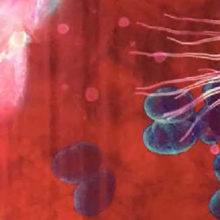Editorial
Issue: Why Microbiology Matters
05 May 2020 article

Welcome to Microbiology Today, which has a new look. This issue is the first of two special editions of the magazine to be published in the 75th anniversary year of the Microbiology Society. As we look back and celebrate during 2020, we are also considering ‘Why Microbiology Matters’. The longer you think about it, the more you realise how in so many ways it does.
Since the first observations of microbes by Antonie van Leeuwenhoek in the 1600s, our understanding of how microbes underpin and impact our lives has advanced considerably. From discovering their life cycles and roles within various environmental niches to harnessing them in industrial processes, and, not least, our ability to utilise them for good, to vaccinate and treat diseases, with many diseases now known to be caused by microbes.
This edition offers a range of insights covering the gamut of the microbial world, with articles outlining why microbes matter for our environment, our health and even space exploration.
The first section is introduced by Lindsay Hall, who shines a spotlight on microbiomes. Lindsay focuses on how research on the interactions between microbial life and their environments has opened up a world of understanding. This section also highlights how our increasing knowledge of these interactions could lead to improved agricultural output and management, or even the creation of a microbial ‘seed bank’.
In the next section, Laura Bowater considers the challenges we face when trying to understand bacteria. Laura provides context and outlines the scale of these challenges by discussing the issues related to antimicrobial resistance and the possible solutions. The articles in this section also provide insight into how new models of microbial culture can aid our overall understanding of microbes in vivo.
Moving on to our attempts to prevent disease, Norman Fry’s section introduces us to vaccines and the global challenges faced in this arena. Reminding us of the many diseases for which vaccines are now available, the articles clarify the vital role vaccination plays in global health.
Public perception of microbiology can often focus on human health and disease, which can mean that the majority of microbes that have a host of other lifestyles and functions can be overlooked. The articles introduced here by Katherine Duncan describe some of these many microbes which can thrive in extreme conditions and are found in every niche around the globe.
Part of the reason for the success of microbes in these varied environments is their genetic plasticity. Charles Dorman introduces the next section on microbial genetics and the role it has played in advancing modern biotechnology. From the original discovery of restriction enzymes through to potential future uses for CRISPR-Cas, the articles presented give real insight into the significance of this area of research.
The advances in microbial genetics, taken alongside technological advances outside the field of microbiology, allow us to consider the role microbiology could play as we progress through the 21st century. Bryn McCulloch and Thorsten Allers discuss new frontiers being tackled by microbiology, alongside articles which help us to see where microbial life has come from, how we can study these complex communities and whether, in the future, microbes could support human space exploration by going where no microbe has gone before!
Given the pandemic spread of COVID-19 it is only too easy to see why virology holds such a central position in both microbiological research and in public perception. Nicola Stonehouse and Natalie Kingston introduce this section, highlighting both viral structures and the ways in which we can manipulate them for human benefit.
In these extraordinary times it has been heartening to see the wonderful responses from microbiologists working to help support the healthcare system. In this year of disastrous contagion which is changing all our lives in different ways, we hope these articles may provide some respite from the overwhelming flow of daily news, and give a broader outlook on microbiology than the one on which we all find ourselves focused at the moment.

Rowena Jenkins
Editor
[email protected]
Image: Dr Chloe James.
